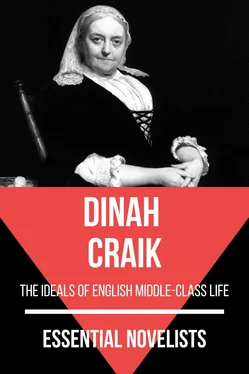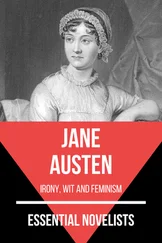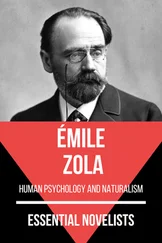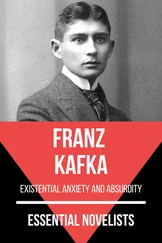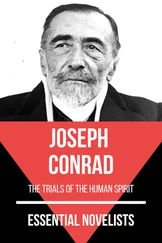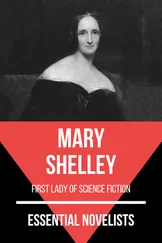“This is not a very long good-bye, I trust?” said she to me, with something more than courtesy. “I shall remain at the Mythe House some weeks, I believe. How long do you purpose staying at Enderley?”
I was uncertain.
“But your home is in Norton Bury? I hope — I trust, you will allow my cousin to express in his own house his thanks and mine for your great kindness during my trouble?”
Neither of us answered. Miss March looked surprised — hurt — nay, displeased; then her eye, resting on John, lost its haughtiness, and became humble and sweet.
“Mr. Halifax, I know nothing of my cousin, and I do know you. Will you tell me — candidly, as I know you will — whether there is anything in Mr. Brithwood which you think unworthy of your acquaintance?”
“He would think me unworthy of his,” was the low, firm answer.
Miss March smiled incredulously. “Because you are not very rich? What can that signify? It is enough for me that my friends are gentlemen.”
“Mr. Brithwood, and many others, would not allow my claim to that title.”
Astonished — nay, somewhat more than astonished — the young gentlewoman drew back a little. “I do not quite understand you.”
“Let me explain, then;” and her involuntary gesture seeming to have brought back all honest dignity and manly pride, he faced her, once more himself. “It is right, Miss March, that you should know who and what I am, to whom you are giving the honour of your kindness. Perhaps you ought to have known before; but here at Enderley we seemed to be equals — friends.”
“I have indeed felt it so.”
“Then you will the sooner pardon my not telling you — what you never asked, and I was only too ready to forget — that we are not equals — that is, society would not regard us as such — and I doubt if even you yourself would wish us to be friends.”
“Why not?”
“Because you are a gentlewoman and I am a tradesman.”
The news was evidently a shock to her — it could not but be, reared as she had been. She sat — the eye-lashes dropping over her flushed cheeks — perfectly silent.
John’s voice grew firmer — prouder — no hesitation now.
“My calling is, as you will soon hear at Norton Bury, that of a tanner. I am apprentice to Abel Fletcher — Phineas’s father.”
“Mr. Fletcher!” She looked up at me — a mingled look of kindliness and pain.
“Ay, Phineas is a little less beneath your notice than I am. He is rich — he has been well educated; I have had to educate myself. I came to Norton Bury six years ago — a beggar-boy. No, not quite that — for I never begged! I either worked or starved.”
The earnestness, the passion of his tone, made Miss March lift her eyes, but they fell again.
“Yes, Phineas found me in an alley — starving. We stood in the rain, opposite the mayor’s house. A little girl — you know her, Miss March — came to the door, and threw out to me a bit of bread.”
Now indeed she started. “You — was that you?”
“It was I.”
John paused, and his whole manner changed into softness, as he resumed. “I never forgot that little girl. Many a time, when I was inclined to do wrong, she kept me right — the remembrance of her sweet face and her kindness.”
That face was pressed down against the sofa where she sat. I think Miss March was all but weeping.
John continued.
“I am glad to have met her again — glad to have been able to do her some small good in return for the infinite good she once did me. I shall bid her farewell now — at once and altogether.”
A quick, involuntary turn of the hidden face asked him “Why?”
“Because,” John answered, “the world says we are not equals, and it would neither be for Miss March’s honour nor mine did I try to force upon it the truth — which I may prove openly one day — that we ARE equals.”
Miss March looked up at him — it were hard to say with what expression, of pleasure, or pride, or simple astonishment; perhaps a mingling of all — then her eyelids fell. She silently offered her hand, first to me and then to John. Whether she meant it as friendliness, or as a mere ceremony of adieu, I cannot tell. John took it as the latter, and rose.
His hand was on the door — but he could not go.
“Miss March,” he said, “perhaps I may never see you again — at least, never as now. Let me look once more at that wrist which was hurt.”
Her left arm was hanging over the sofa — the scar being visible enough. John took the hand, and held it firmly.
“Poor little hand — blessed little hand! May God bless it evermore.”
Suddenly he pressed his lips to the place where the wound had been — a kiss long and close, such as only a lover’s kiss could be. Surely she must have felt it — known it.
A moment afterward, he was gone.
That day Miss March departed, and we remained at Enderley alone.
––––––––
It was winter-time. All the summer-days at Enderley were gone, “like a dream when one awaketh.” Of her who had been the beautiful centre of the dream we had never heard nor spoken since.
John and I were walking together along the road towards the Mythe; we could just see the frosty sunset reflected on the windows of the Mythe House, now closed for months, the family being away. The meadows alongside, where the Avon had overflowed and frozen, were a popular skating-ground: and the road was alive with lookers-on of every class. All Norton Bury seemed abroad; and half Norton Bury exchanged salutations with my companion, till I was amused to notice how large John’s acquaintance had grown.
Among the rest there overtook us a little elderly lady, as prim and neat as an old maid, and as bright-looking as a happy matron. I saw at once who it was — Mrs. Jessop, our good doctor’s new wife, and old love: whom he had lately brought home, to the great amazement and curiosity of Norton Bury.
“She seems to like you very much,” I said; as, after a cordial greeting, which John returned rather formally, she trotted on.
“They were both very kind to me in London, last month, as I think I told you.”
“Ay!” It was one of the few things he had mentioned about that same London journey, for he had grown into a painful habit of silence now. Yet I dreaded to break it, lest any wounds rankling beneath might thereby be caused to smart once more. And our love to one another was too faithful for a little reserve to have power to influence it in any way.
We came once more upon the old lady, watching the skaters. She again spoke to John, and looked at me with her keen, kind, blue eyes.
“I think I know who your friend is, though you do not introduce him.” (John hastily performed that ceremony.) “Tom, and I” (how funny to hear her call our old bachelor doctor, “Tom!”) “were wondering what had become of you, Mr. Halifax. Are you stronger than you were in London?”
“Was he ill in London, madam?”
“No, indeed, Phineas! Or only enough to win for me Dr. and Mrs. Jessop’s great kindness.”
“Which you have never come to thank us for. Never crossed our door-sill since we returned home! Does not your conscience sting you for your ingratitude?”
He coloured deeply.
“Indeed, Mrs. Jessop, it was not ingratitude.”
“I know it; I believe it,” she answered, with much kindness. “Tell me what it was?”
He hesitated.
“You ought to believe the warm interest we both take in you. Tell me the plain truth.”
“I will. It is that your kindness to me in London was no reason for my intruding on you at Norton Bury. It might not be agreeable for you and Dr. Jessop to have my acquaintance here. I am a tradesman.”
Читать дальше
